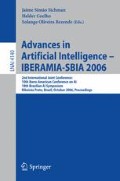Abstract
The idea behind hyper-heuristics is to discover some combination of straightforward heuristics to solve a wide range of problems. To be worthwhile, such combination should outperform the single heuristics. This paper presents a GA-based method that produces general hyper-heuristics that solve two-dimensional cutting stock problems. The GA uses a variable-length representation, which evolves combinations of condition-action rules producing hyper-heuristics after going through a learning process which includes training and testing phases. Such hyper-heuristics, when tested with a large set of benchmark problems, produce outstanding results (optimal and near-optimal) for most of the cases. The testebed is composed of problems used in other similar studies in the literature. Some additional instances of the testbed were randomly generated.
Access this chapter
Tax calculation will be finalised at checkout
Purchases are for personal use only
Preview
Unable to display preview. Download preview PDF.
References
Beasley, J.E.: Beasley operations research library. Collection of problems for 2D packing and cutting (2003)
Berkey, J.O., Wang, P.Y.: Two-dimensional finite bin packing algorithms. Journal of Operational Research Society 38, 423–429 (1987)
Burke, E., Hart, E., Kendall, G., Newall, J., Ross, P., Schulenburg, S.: Hyperheuristics: An emerging direction in modern research technolology. In: Handbook of Metaheuristics, pp. 457–474. Kluwer Academic Publishers, Dordrecht (2003)
Cheng, C.H., Fiering, B.R., Chang, T.C.: The cutting stock problem. a survey. International Journal of Production Economics 36, 291–305 (1994)
Dyckhoff, H.: A topology of cuting and packing problems. European Journal of Operation Research 44, 145–159 (1990)
Garey, M., Johnson, D.: Computers and Intractability. W.H. Freeman and Company, New York (1979)
Goldberg, D.: Genetic Algorithms in Search, Optimization and Machine Learning. Addison Wesley, Reading (1989)
Goldberg, D., Korb, B., Deb, K.: Messy genetic algorithms: Motivation, analysis and first results. Complex Systems, 93–130 (1989)
Golden, B.L.: Approaches to the cutting stock problem. AIIE Transactions 8, 256–274 (1976)
Holland, J.: Adaptation in Natural and Artificial Systems. The University of Michigan Press, Ann Arbor (1975)
Hopper, E., Turton, B.C.: An empirical study of meta-heuristics applied to 2D rectangular bin packing. Studia Informatica Universalis, 77–106 (2001)
Jakobs, S.: On genetic algorithms for the packing of polygons. European Journal of Operations Research 88, 165–181 (1996)
Kantorovich, L.V.: Mathematical methods of organizing and planning production. Management Science 6, 366–422 (1960)
Liu, D., Teng, H.: An improved bl-algorithm for genetic algorithm of the orthogonal packing of rectangle. European Journal of Operations Research 112, 413–419 (1999)
Martello, S., Vigo, D.: Exact solution of the two-dimensional finite bin packing problem. Dipartimento di Elettronica, Informatica e Sistematica (1998)
Ross, P., Blázquez, J.M., Schulenburg, S., Hart, E.: Learning a procedure that can solve hard bin-packing problems: A new ga-based approach to hyper-heuristics. In: Proceedings of GECCO 2003, pp. 1295–1306 (2003)
Ross, P., Schulenburg, S., Blázquez, J.M., Hart, E.: Hyper-heuristics: learning to combine simple heuristics in bin-packing problems. In: Proceedings of GECCO 2002, pp. 942–948 (2002)
Terashima-Marín, H., Flores-Álvarez, E.J., Ross, P.: Hyper-heuristics and classifier systems for solving 2D-regular cutting stock problems. In: Proceedings of the Genetic and Evolutionary Computation Conference 2005, pp. 637–643 (2005)
Terashima-Marín, H., Morán-Saavedra, A., Ross, P.: Forming hyper-heuristics with GAs when solving 2D-regular cutting stock problems. In: Proceedings of the Congress on Evolutionary Computation, pp. 1104–1110 (2005)
Author information
Authors and Affiliations
Editor information
Editors and Affiliations
Rights and permissions
Copyright information
© 2006 Springer-Verlag Berlin Heidelberg
About this paper
Cite this paper
Terashima-Marín, H., Farías-Zárate, C.J., Ross, P., Valenzuela-Rendón, M. (2006). Two-Phase GA-Based Model to Learn Generalized Hyper-heuristics for the 2D-Cutting Stock Problem. In: Sichman, J.S., Coelho, H., Rezende, S.O. (eds) Advances in Artificial Intelligence - IBERAMIA-SBIA 2006. IBERAMIA SBIA 2006 2006. Lecture Notes in Computer Science(), vol 4140. Springer, Berlin, Heidelberg. https://doi.org/10.1007/11874850_24
Download citation
DOI: https://doi.org/10.1007/11874850_24
Publisher Name: Springer, Berlin, Heidelberg
Print ISBN: 978-3-540-45462-5
Online ISBN: 978-3-540-45464-9
eBook Packages: Computer ScienceComputer Science (R0)

